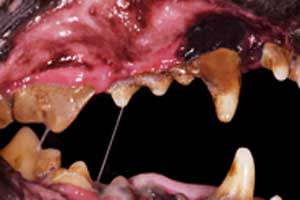It's important to look after your dog's teeth. Around 80% of dogs aged over three years have gum disease and require treatment.
Even with regular tooth brushing, most dogs develop a build-up of plaque on their teeth. This gradually forms a creamy brown, shell-like scale of tartar, which can cause gum disease and contribute to tooth decay and loss of teeth - all of which can be very painful.
Other causes of dental disease include poor teeth occlusion (where teeth don't meet properly), inflammatory diseases of the gums that can also affect the roots of the teeth, mouth tumours, and mouth injuries.
Signs of dental disease include:
- Redness of gums.
![Image courtesy of Pet Smile month Dental disease in dogs]()
- Swelling.
- Bleeding gums.
- Plaque on the surface of the teeth.
- Bad breath.
- Any signs of discomfort or pain when chewing food.
- Not eating.
Clinical signs of dental disease in dogs
At the vet's, affected dogs can be checked over and an assessment made of the severity of any problems, depending on whether they are limited to discoloured deposits on the teeth, or there is gingivitis (inflammation of the gums), gingival infection, or even obvious abscess formation in the gums or on the cheeks, some dogs may need anaesthesia to allow a proper assessment of their mouths.
Even a dog with severe mouth pain may have no evidence of gum infection or tooth disease, and an X-ray of the tooth roots may be needed to allow identification of a damaged or painful tooth so that it can be removed.
Abnormal swellings in the mouth can be difficult to assess. Some relate to chronic infection in the gums and may resolve with antibiotics.
Other swellings can relate to the presence of foreign bodies in the mouth, such as splinters or fragments of bone, and mouth tumours may also be seen. Examination under anaesthesia may be necessary so X-rays can be taken, and tissue samples biopsied.
Bacteria from the teeth, gums and tooth roots can access the bloodstream, which enables them to travel all round the body and set up infections elsewhere. Dogs can even develop heart disease due to infection of the heart valves, which has originated from the teeth. Any signs of disease should be checked out, and even subtle signs of dental infections may need prompt treatment if more serious consequences are to be avoided.
Treatment of dental disease
Many animals benefit from occasional dental work to descale and polish teeth. General anaesthesia is needed to immobilise the animal so he won't choke. Keeping the teeth clean and healthy helps to prevent bacteria getting into the gums. This is what causes secondary infections, which can infect the tooth roots and surrounding jaw bone, loosen teeth and cause abscesses.
Antibiotics may be needed to treat infections, and pain relief may be beneficial. Damaged and broken teeth may need to be removed, although in some cases fillings may be appropriate.
Dogs with abnormal lumps and bumps in the mouth may need to have them removed, or biopsied and sent to a laboratory for assessment. Gingival hyperplasia (gum overgrowth), also known as epulis, can be seen in some dogs, most often Boxers. Overgrown gums can lead to pocketing of food around the teeth and can contribute to dental decay so the removal of affected areas is often necessary. Some malignant mouth and tongue tumours can progress very rapidly if it is not possible to remove them promptly.
Preventing dental disease
Make sure that the dog is generally as healthy as possible and that he is being fed a healthy, well-balanced diet. Ideally the food should be partly constituted of dry kibble, as dry crunchy foods help to abrade the teeth as they are eaten.
Regular cleaning is vital. Toothpastes or oral hygiene gels can be used to brush the teeth - oral hygiene gels can also be applied directly on to the teeth with a finger to help dissolve plaque, or even added to food. You can add oral antiseptics to drinking water, which reduce the levels of bacteria in the mouth. Finally, frequent use of dental chews and bones has a major role in keeping the teeth clean and healthy.








